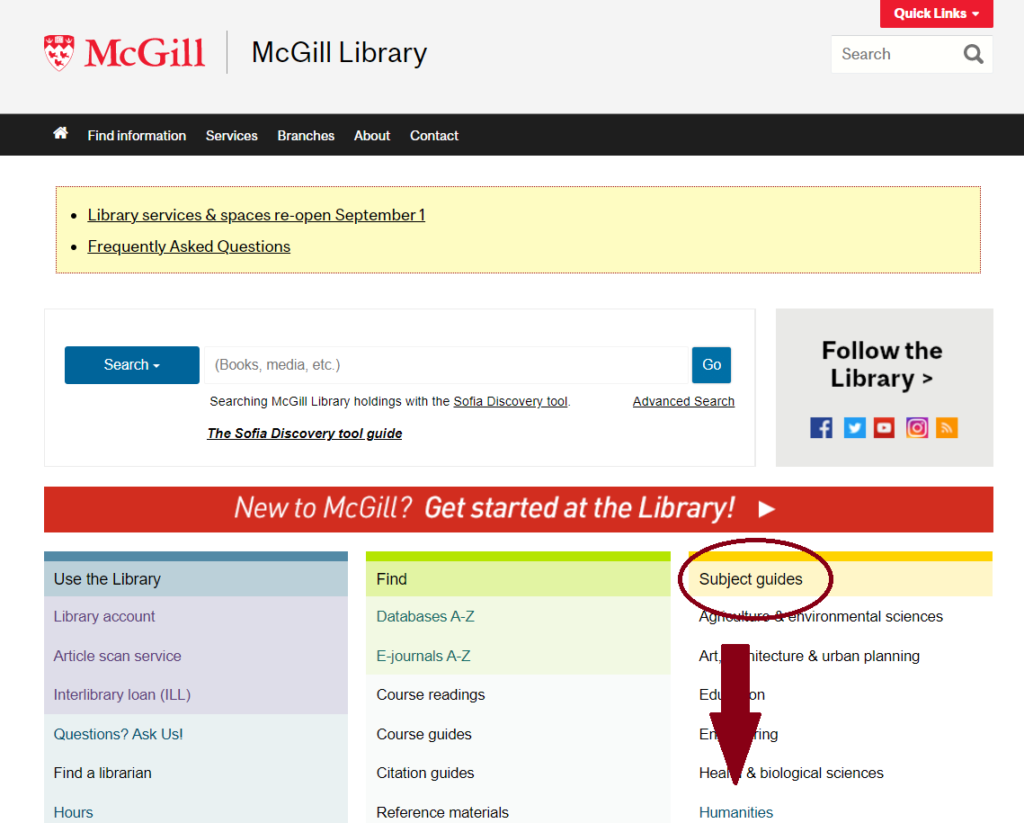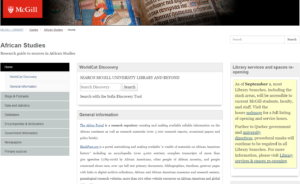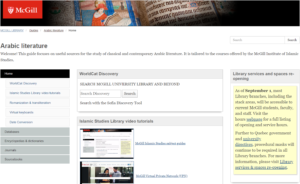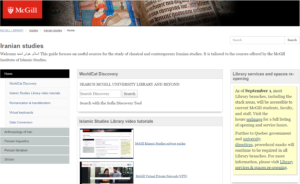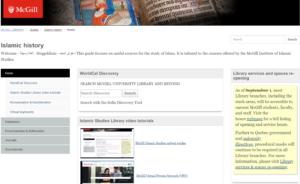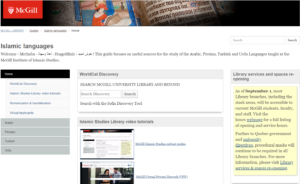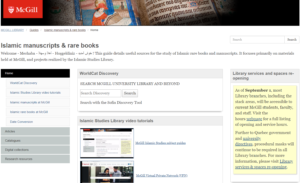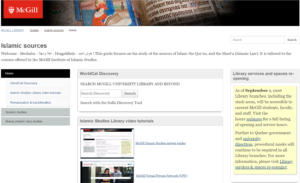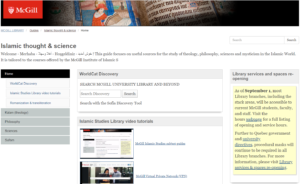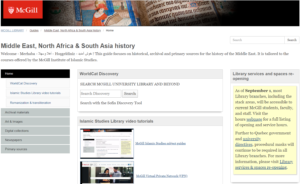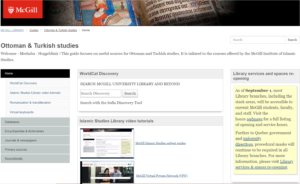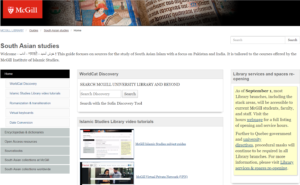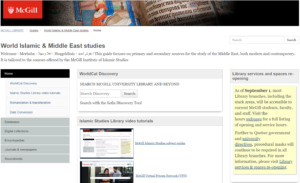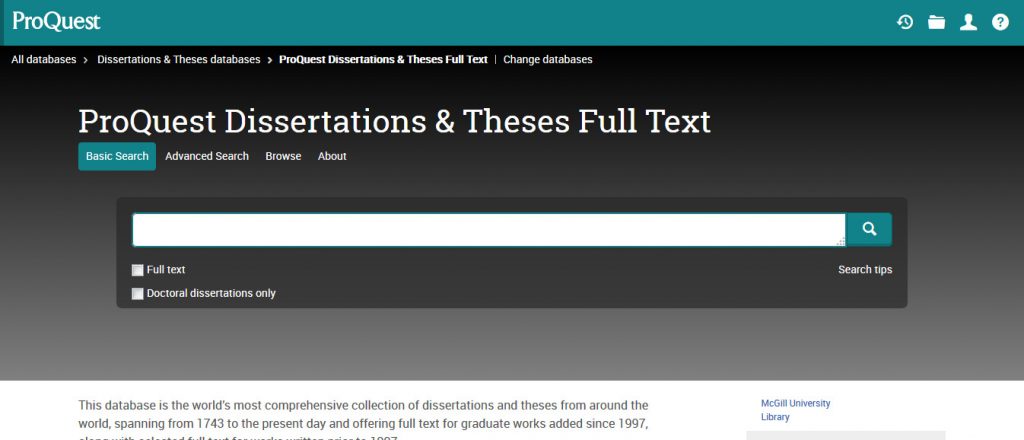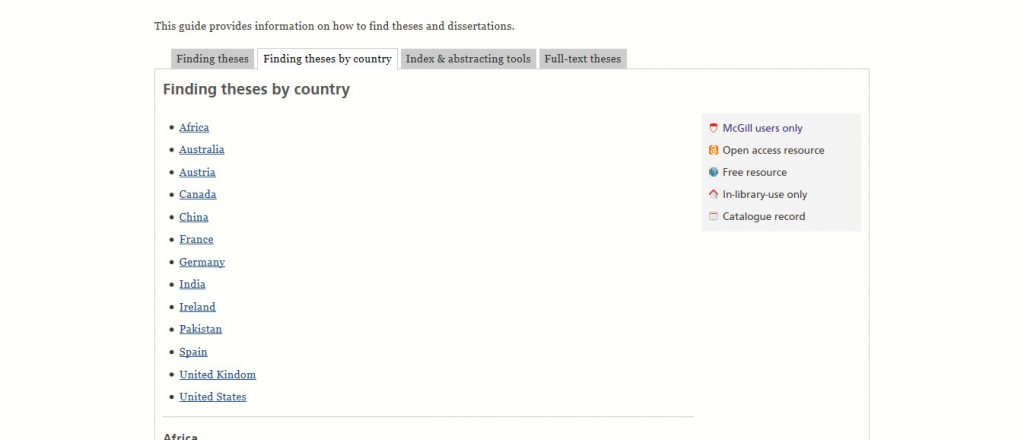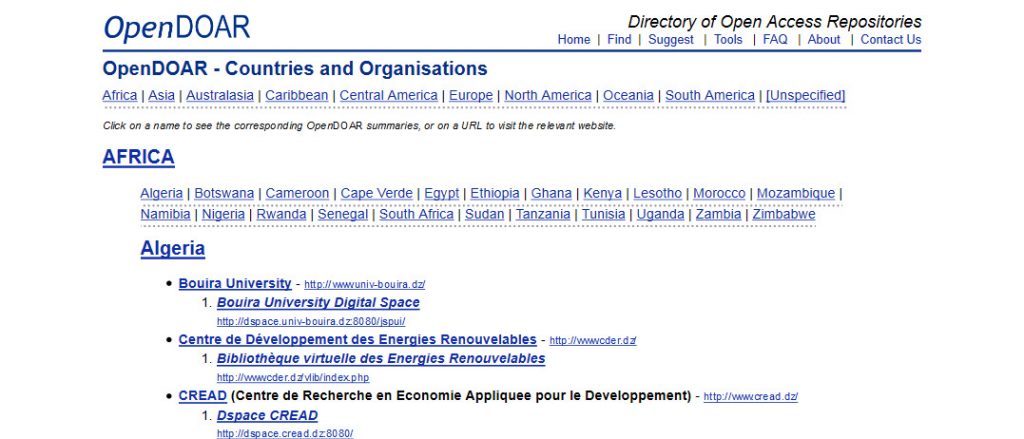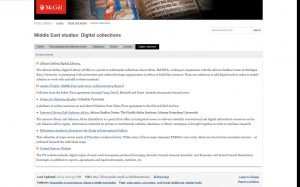The following document is a selection of online primary sources available not only at McGill Library but also on the web, compiled for HIST 591 Course (Fall 2013):
DATABASES AVAILABLE @ MCGILL
– Archives unbound. Gale, Cengage Learning, 2012.
Archives Unbound presents topically-focused digital collections of historical documents.
- Evangelism and the Syria-Lebanon Mission: Correspondence of the Board of Foreign Missions, 1869-1910
- The records of the Board of Foreign Missions provide invaluable information on social conditions in Greater Syria (and Lebanon) and on efforts to spread the gospel during the nineteenth century. Documenting the church’s educational, evangelical, and medical work, these are records mainly of incoming correspondence from the mission field and outgoing correspondence from the Board headquarters
- The Middle East Online: Iraq, 1914-1974
Iraq 1914-1974 offers the widest range of original source material from the Foreign Office, Colonial Office, War Office and Cabinet Papers from the Anglo-Indian landing in Basra in 1914 through the British Mandate in Iraq of 1920-32 to the rise of Saddam Hussein in 1974. Here major policy statements are set out in their fullest context, the minor documents and marginalia revealing the workings of the mandate administration, diplomacy, treaties, oil and arms dealing. Topics covered include: The Siege of Kut-al-Amara, The War in Mesapotamia and the capture of Baghdad in 1917, Introduction of the British Mandate, and the installation of King Faisal in 1921, The British administration in Baghdad, Gertrude Bell, advisor to the British administration, in both reports and memos, The Arab Uprising of 1920, Independence, and Iraq’s membership of the League of Nations in 1932, Coups d’etat in the 1930s and 1940s, The Baghdad Pact of 1955 and the military coup of 1958 leading to the establishment of a republic, The Cold War and Soviet intervention in Iraq, Kurdish unrest and the war in Kurdistan, Oil concessions and oil exploration, The Rise of Ba’athism and Saddam Hussein, The USSR-Iraq Treaty of Friendship in 1972, Iran-Iraq relations
- The Middle East Online: Arab-Israeli Relations, 1917-1970
Arab-Israeli Relations 1917-1970—offers the widest range of original source material from the British Foreign Office, Colonial Office, War Office and Cabinet Papers from the 1917 Balfour Declaration through to the Black September war of 1970-1. Here major policy statements are set out in their fullest context, the minor documents and marginalia revealing the workings of colonial administration and, following the creation of the State of Israel in 1948, British diplomacy towards Israel and the Arab states. Additional value has been by the expansion from the original 562 National Archives records to over 17,000, thus substantially improving access to over 138,000 pages documenting the politics, administration, wars and diplomacy of the Palestine Mandate, the Independence of Israel and the Arab-Israeli conflict. Some of the topics covered include the British capture of Jerusalem, the milestones in the Palestine-Zionist tension and their impact on British policy leading to the Partition of 1948, Jewish terror groups, the background to the establishment of the State of Israel as a Jewish national home, the Border wars of the 1950s, formation of the United Arab Republic, the Cold War in the Middle East and Black September
- The King and the People in Morocco, 1950-1959
Morocco’s strategic location has shaped its history. After gaining independence in 1956, Morocco made great strides toward economic and political liberalization. The sultan Muhammad V, ruling his newly independent nation, proclaimed his intention of turning it into a constitutional monarchy. His first act was to transform himself into a monarch and assume the title of king. The Moroccan government undertook a number of economic, social, and political reforms, including the drafting of a constitution.
– Confidential Print: Middle East. Marlborough, Wiltshire, England: Adam Matthew Digital, 2000.
The Confidential Print series, issued by the Foreign and Colonial Offices since c. 1820, originated out of a need for the Government to preserve all of the most important papers generated by the Foreign and Colonial Offices. Some of these are one-page letters or telegrams; others are large volumes or texts of treaties.
It covers the Egyptian reforms of Muhammad Ali Pasha in the nineteenth century, the Middle East Conference of 1921, the Mandates for Palestine and Mesopotamia and the Suez Crisis in 1956, the partition of Palestine, post-Suez Western foreign policy and the Arab-Israeli conflict.
All documents are fully text-searchable.
– Foreign Broadcast Information Service (FBIS) Daily reports
Foreign Broadcast Information Service (FBIS) Daily Reports consists of daily reports published from September 4, 1941 through March 29, 1974
Foreign Broadcast Information Service (FBIS) Daily Report Annexes consists of annexes created by the U.S. intelligence community to benefit analysts and policy makers, originally published from April 1974 through September 1996.
– The Listener: historical archives (1929-1991). Gale, Cengage Learning, 2011.
The Listener was a weekly publication, established by the BBC in 1929 as the medium for reproducing radio – and later, television – programmes in print. It is the only record and means of accessing the content of many early broadcasts. In addition to expanding on the intellectual broadcasts of the week, it also discussed contemporary issues (including political issues), and regularly reviewed new books. 10% of its content was actually not connected to broadcasting at all. What united the very diverse articles was the BBC’s cultural mission of educating the masses. Having chronicled the transformative rise of radio and television, The Listener finally ceased publication in 1991, just on the dawn of the internet age.
– PAIS Archive (1915-1976)
Consists of indexing and abstracting of articles, books, conference proceedings, government documents, book chapters, and statistical directories about public affairs.
– ProQuest historical annual Reports
Provides access to 43,000 annual reports (1844-current) of over 800 companies. Searchable puff images with indexed data such as: financial, Fortune 500 ranking, industry classification, key people, geographic location, auditor and related companies.
– World News Connection
Offers translated and English language news and information compiled from non-United States media sources.
Coverage includes political, environmental, scientific, technical, and socioeconomic issues and events.
Contains information derived from full-text and summaries of newspaper articles, conference proceedings, television and radio broadcasts, periodicals, and non-classified technical reports.
ON THE INTERNET: DIGITAL COLLECTIONS AND WEBSITES
– ARTstor
ARTstor is a digital Library of nearly one million images in the areas of art, architecture, the humanities and social sciences. Browse by geographical area to find images of the Middle East.
– The Avalon Project. Yale Law School
The Avalon Project includes documents relevant to the fields of Law, History, Economics, Politics, Diplomacy and Government. Collection: “The Middle East 1916-2001: a documentary record”
– British History online. Institute of Historical Research, and History of Parliament Trust
BHO is the digital library containing some of the core printed primary and secondary sources for the history of the British Isles, including administrative, legal, and parliamentary documents. Created by the Institute of Historical Research and the History of Parliament Trust, it aims to support academic and personal users around the world and their learning and research.
– EuroDocs. Richard Hacken, European Studies Bibliographer at the Harold B. Lee Library, Brigham Young University, Provo, Utah, USA.
Online sources for European History: includes legal and governmental documents, transcriptions, facsimiles and commentaries
– Gallica. Bibliothèque Nationale de France
- Voyage en Afrique
This digital collection offers a wide selection of documents, primarily in French, covering the entire African continent in the 18th and 19th century. Contents include: maps of peoples and kingdoms, colonial history, physical map, antique maps, nautical maps, full text books, journal articles, maps illustrating themes: L’Europe decouvre l’Afrique, L’Afrique des cultures, Histoire coloniale : la France en Afrique, L’Afrique vue depuis la France. Journal articles (Bulletins de la Societe d’anthropologie de Paris; Bulletin de la Societe de geographie de Paris; le Tour du Monde, 1860-191; La Geographie; Bulletin de la Societe de geographie commerciale de Bordeaux; Revue maritime et coloniale, Annales des voyages, de la geographie et de l’histoire: Nouvelles annales des voyages, de la geographie et de l’histoire and many more. An entire section of the website is dedicated to the history of French colonial policy in Africa (1830-1945)
- La quinzaine coloniale
La quinzaine coloniale was the official journal of the French colonial Union. Published between 1897 and 1914, but the BNF only digitized issues running from 1901 to 1914.
– Gertrude Bell Archive. Newcastle University Library
The Gertrude Bell Archive comprise Gertrude’s personal correspondence, diaries and miscellaneous items, such as Review of the Civil Administration of Mesopotamia (1920), notebooks, obituaries, lecture notes and miscellaneous reports, memoranda and cuttings. Approximately 1,600 letters and diaries covering the years 1877-1879 and 1893-1900 (with some gaps reflecting where there is no hard-copy of the diary) can be found transcribed on this website, along with approximately 7,000 of her archaeological and travel photographs.
– Internet Archive
The Internet Archive is a non-profit organization building a digital library of Internet sites and other cultural artifacts in digital form. Like a paper library, IA provides free access to researchers, historians, scholars, the print disabled, and the general public.
Sources are primarily on and from the U.S. but the Internet Archives makes accessible some very interesting books (travel accounts, or memoirs) digitized. Search by country name (Sudan, Syria, Algeria, etc…)
– Matson (G. Eric and Edith) Photograph Collection. Library of Congress
The G. Eric and Edith Matson Photograph Collection is a rich source of historical images of the Middle East. The majority of the images depict Palestine (present day Israel and the West Bank) from 1898 to 1946. Most of the collection consists of over 22,000 glass and film photographic negatives and transparencies created by the American Colony Photo Department and its successor firm, the Matson Photo Service. Over 1,000 photographic prints and eleven albums are also part of this collection.
Digital images for the negatives and transparencies and a sample of the photographs are available online.
– The Middle East in Early Prints and Photographs. New York Public Library
This digital collection gives access to several thousand prints and photographs contained in works from the 17th century to the beginning of the 20th century. These include books illustrated with prints or photographs, photograph albums, and archival compilations; the processes represented range from engravings to lithographs, and from salt prints to heliogravures.
– The Palestine Poster Project Archives. Dan Walsh, MA student at Georgetown University (2011)
The Palestine Poster Project Archives is a web-based archives that displays a broad range of Palestine posters in a searchable format with each poster translated and interpreted. Titles included are from the Liberation Graphics collection, the Library of Congress, the Central Zionist Archives in Jerusalem, the International Institute of Social History in Amsterdam, Yale University, the University of Chicago and a host of other sources. Currently, archives contains 5593 posters and 1237 artists
– Palestinian Academic Society for the Study of International Affairs
This collection of maps covers much of Palestine’s modern history. While many of these maps represent PASSIA’s own work, others are drawn from secondary sources – as indicated beneath the individual maps.
– Perry-Castañeda Library Map Collection. University of Texas at Austin.
This University of Texas at Austin Libraries website offers access to a great number of their historical maps which have been digitized. It also provides a lengthy list of links to some other historical maps websites. Both their digital collection of historical maps and the list of websites can be browsed by geographic region (Africa / Middle East).
– Sudan Open Archives. Rift Valley Institute, 2005.
The Sudan Open Archives offers free digital access to historical and contemporary books and documents about all regions of Sudan. It is an expanding, word-searchable, full-text database.
– United Nation Relief and Works Agency (UNRWA) Photo archive
– United Nations Website
– World Ditigal Library
The World Digital Library (WDL) makes available on the Internet, free of charge and in multilingual format, significant primary materials from countries and cultures around the World. The “Middle-East and North Africa” corpus includes 1712 documents.



